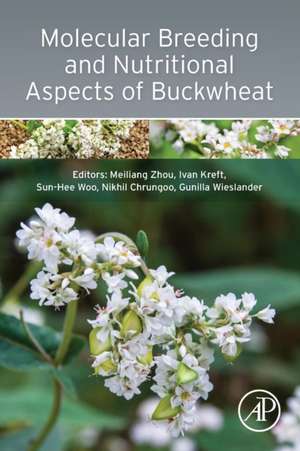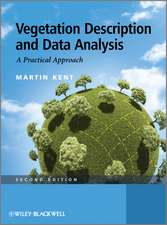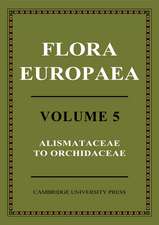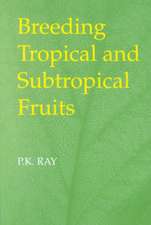Molecular Breeding and Nutritional Aspects of Buckwheat
Autor Meiliang Zhou, Ivan Kreft, Sun-Hee Woo, Nikhil Chrungoo, Gunilla Wieslanderen Limba Engleză Paperback – 31 mai 2016
With detailed information on buckwheat regeneration, genetic transformation, gene function analysis, and the metabolic engineering of bioactive compounds, the book guides readers through a variety of buckwheat varietal adaptations, providing foundation information on which additional research should be conducted.
It is divided into four parts, including genetic resource and phylogenetic relationship, food nutrition, growth and cultivation, and molecular breeding, with each section providing insights into the most current developments.
- Addresses all aspects of buckwheat research, including genetic resources, biological nutrition, genetic transformation, and molecular breeding
- Presents global characterization on the genetic resource of Fagopyrum, giving researchers insights that will help them breed new cultivars
- Explores the bioactivity of buckwheat
- Includes detailed information on the environmental factors that affect the growth and production of buckwheat
Preț: 516.60 lei
Preț vechi: 567.69 lei
-9% Nou
Puncte Express: 775
Preț estimativ în valută:
98.85€ • 103.76$ • 82.05£
98.85€ • 103.76$ • 82.05£
Carte tipărită la comandă
Livrare economică 03-17 aprilie
Preluare comenzi: 021 569.72.76
Specificații
ISBN-13: 9780128036921
ISBN-10: 0128036923
Pagini: 482
Dimensiuni: 152 x 229 x 27 mm
Greutate: 0.79 kg
Editura: ELSEVIER SCIENCE
ISBN-10: 0128036923
Pagini: 482
Dimensiuni: 152 x 229 x 27 mm
Greutate: 0.79 kg
Editura: ELSEVIER SCIENCE
Public țintă
Bachelor, master, PhD students of Agronomy or Plant Biology, and buckwheat researchers seeking a comprehensive overview on the present knowledge about molecular breeding and food nutrition of Buckwheat.Cuprins
Part 1-Genetic resource and Phylogenetic relationship Chapter 1. Molecular taxonomy of the genus Fagopyrum Chapter 2. Genetic resource of buckwheat in China Chapter 3. Genetic diversity in Himalayan buckwheats: a perspective for use in crop improvement programmes Chapter 4. State and perspectives of buckwheat production in Russia Chapter 5. Buckwheat Breeding and Seed Production in Poland
Part 2-Food nutrition Chapter 6. Reduction in serum levels of myeloperoxidase and cholesterol when eating buckwheat cookies Chapter 7. Quercetin-induced Hep G 2 cells autophagy was mediated by intracellular Ca2+ Chapter 8. Progress on bioactivity of buckwheat flavonoids Chapter 9. Localisation of mineral elements in common and tartary buckwheat grain as revealed by multielemental and quantitative micro-PIXE Chapter 10. Different treatments applied to Tartary buckwheat whole flour to preserve rutin
Part 3- Growth and Cultivation Chapter 11. Effect of drought stress on photosynthetic physiology and yield of Tartary buckwheat Chapter 12. Optical properties of Tartary and hybrid buckwheats treated with Se and UV radiation Chapter 13. Effect of day and night temperature on the expression of the plant shape in a Kiku-type buckwheat line
Part 4-Molecular breeding Chapter 14. Present status, future breeding strategy and prospects for buckwheat Chapter 15. Breeding of ‘Manten-Kirari’, a non-bitter and trace-rutinosidase variety in Tartary buckwheat, and de novo sequencing of transcriptome and mass discovery of SNPs Chapter 16. Intact S-ELF 3 is exclusive to heteromorphic SI species in Fagopyrum Chapter 17. Mining, characterization and application of microsatellite markers using next generation sequencing data from buckwheat (Fagopyrum Mill) Chapter 18. Discover of common buckwheat dwarf mutation and the ideal plant type hybrid breeding
Part 5-Biotechnology Chapter 19. MYB transcription factors regulate buckwheat flavonoids biosynthesis Chapter 20. Hairy root culture of buckwheat Chapter 21. Plant regeneration from cotyledon tissues of common buckwheat (Fagopyrum esculentum Moench)
Part 2-Food nutrition Chapter 6. Reduction in serum levels of myeloperoxidase and cholesterol when eating buckwheat cookies Chapter 7. Quercetin-induced Hep G 2 cells autophagy was mediated by intracellular Ca2+ Chapter 8. Progress on bioactivity of buckwheat flavonoids Chapter 9. Localisation of mineral elements in common and tartary buckwheat grain as revealed by multielemental and quantitative micro-PIXE Chapter 10. Different treatments applied to Tartary buckwheat whole flour to preserve rutin
Part 3- Growth and Cultivation Chapter 11. Effect of drought stress on photosynthetic physiology and yield of Tartary buckwheat Chapter 12. Optical properties of Tartary and hybrid buckwheats treated with Se and UV radiation Chapter 13. Effect of day and night temperature on the expression of the plant shape in a Kiku-type buckwheat line
Part 4-Molecular breeding Chapter 14. Present status, future breeding strategy and prospects for buckwheat Chapter 15. Breeding of ‘Manten-Kirari’, a non-bitter and trace-rutinosidase variety in Tartary buckwheat, and de novo sequencing of transcriptome and mass discovery of SNPs Chapter 16. Intact S-ELF 3 is exclusive to heteromorphic SI species in Fagopyrum Chapter 17. Mining, characterization and application of microsatellite markers using next generation sequencing data from buckwheat (Fagopyrum Mill) Chapter 18. Discover of common buckwheat dwarf mutation and the ideal plant type hybrid breeding
Part 5-Biotechnology Chapter 19. MYB transcription factors regulate buckwheat flavonoids biosynthesis Chapter 20. Hairy root culture of buckwheat Chapter 21. Plant regeneration from cotyledon tissues of common buckwheat (Fagopyrum esculentum Moench)







